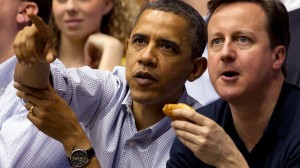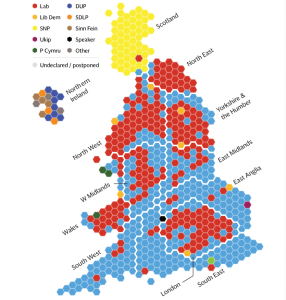Not that Nige can’t be a bit cheeky and that there can’t be political banter in England, but the best way to describe the recent British elections on May 7th is probably not through cheek and banter. Instead, think of this as a starting point for all the inevitable political discussion that’ll arise when you’re at Surrey.
Is it just like a Presidential Election?
In a word, no. It’s time to throw out all your ideas about who will control the House or the Senate and stop trying to figure out Electoral College votes because a General Election in Britain is a very different thing.
The Process
The Parties
Conservative Party (The Tories) – Headed by David Cameron, the Conservatives won 331 seats in the election, meaning they could form a government. They are pro-business, want a referendum on the UK’s EU membership, and have plans to reform the social welfare system and NHS to better grow the economy.
Labour Party – At the time of the election, Labour was headed by Ed Milliband, who seemed to have gained a following of teenage girls called ‘Millifans’ without explanation. Labour want to increase government spending, but somehow remain popular among students with their ongoing promise to reduce university fees to £6,000 per year with money the government doesn’t have.
United Kingdom Independence Party (Ukip) – Ukip have many policies similar to the Conservatives, but are a bit more right wing. As the name suggests, they want to leave the EU, cut benefits for migrants, and reduce immigration. Their leader is Nigel Farage, and incredibly charismatic man who appeals to people from all walks of life and is almost always pictured with a pint. Despite having the third largest percentage of votes, Ukip only had one MP elected.
Scottish National Party (SNP) – You may or may not be aware of the unsuccessful Scottish independence referendum last year, and SNP are not happy with the outcome. The party are criticised for being leftist and with only Scottish issues in mind. They won all but two seats in Scotland.
Others – There are the Liberal Democrats (Lib Dems), who were in a coalition government with the Conservatives from 2010 to 2015. They suffered a devastating loss in seats at the election, and always seem ‘neither here nor there’ policy wise. The rest of the parties, however, are much more strong willed. Greens, which have the environment in mind; Plaid Cymru, the Welsh nationalist party, and the variety of Northern Irish parties. Nonetheless, keep the first few in mind and your political discussion at Surrey should be right on par.
Can I vote?
If you’re reading this blog, probably not. But if perhaps you’re a British Citizen, then of course you can. You can also vote if you’re a citizen of a Commenwealth country, but sadly if you’re nothing more than a Yank, you’re out of luck.


